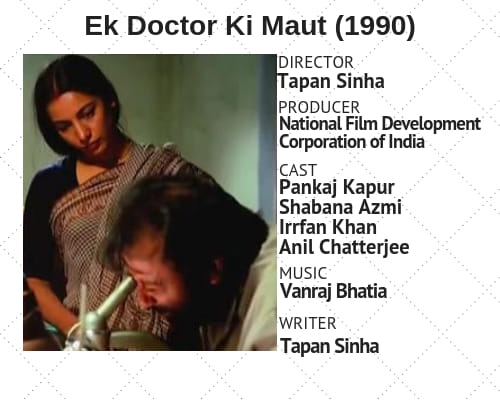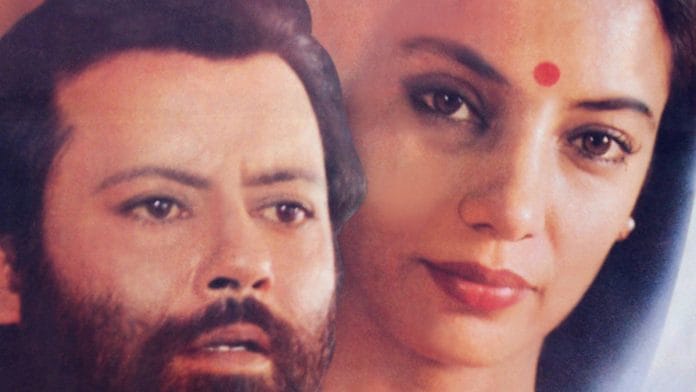When doctors protested across India this week, many asked if it was ethical for medical professionals to stop work. After all, it is considered one of the ‘noble’ professions that affect humanity. And while there are many faults in the field of medicine and scientific research, there is a lot we don’t understand as non-medical professionals. This week, ThePrint looks at the classic tale of a struggle by a man of science with Ek Doctor Ki Maut.
 Starring Pankaj Kapur, Shabana Azmi, and Irrfan Khan, the film Ek Doctor Ki Maut looks at the story of a doctor, who sacrifices 10 years of life to find a vaccine for leprosy. Dr Dipankar Roy (Kapur) lives life with blinders on, with eyes only for his research. His obsession with vaccine research is so acute that he often forgets to eat and doesn’t even sleep, neglecting his wife Seema (Azmi) to the point where she considers leaving him. However, she loves him and remains by his side throughout. Soon Dr Roy makes a breakthrough, which is covered by his journalist friend, Amulya (Khan), and he becomes the centre of attention.
Starring Pankaj Kapur, Shabana Azmi, and Irrfan Khan, the film Ek Doctor Ki Maut looks at the story of a doctor, who sacrifices 10 years of life to find a vaccine for leprosy. Dr Dipankar Roy (Kapur) lives life with blinders on, with eyes only for his research. His obsession with vaccine research is so acute that he often forgets to eat and doesn’t even sleep, neglecting his wife Seema (Azmi) to the point where she considers leaving him. However, she loves him and remains by his side throughout. Soon Dr Roy makes a breakthrough, which is covered by his journalist friend, Amulya (Khan), and he becomes the centre of attention.
The positive reception to his vaccine, however, turns sour when the government (his bosses) and his peers start doubting his research and findings, completely discrediting him. When he protests, he is transferred to a small village by his bosses who harbour political spite. His credibility hangs by a thread as his work in engulfed in bureaucratic neglect and sabotage campaigns by his peers. In the end, Dr Roy loses out on the recognition that he truly deserves but is compensated with something else, and manages to keep what is actually important to him – his love for science and helping mankind.
The film is aptly named by writer, director and editor Tapan Sinha, as it shows the slow death of ingenuity and innovation in India thanks to a broken and corrupt system. Many people choose medicine to help people, but are waylaid with the attraction of private practice, that helps them earn more, as well as the politics that comes with being in a social profession. Another issue, of course, is being taken for granted by a system that undervalues and underappreciates them.
Also read: Kissa Kursee Ka: A parody that sent Sanjay Gandhi to jail and laid bare Indian politics
Thriving in such a system is frustrating, and Pankaj Kapur plays an exasperated and impatient man to the T. His love for his work is very evident, and his desire to help rid the world of a deadly disease, even more so. He is a tortured man, who loves his wife and friends, but struggles to show it because, for him, science, and the logic that comes with it, always comes first. Pankaj Kapur does a brilliant job showing these complex layers of his character, making you empathise and get annoyed with him simultaneously. He got the Special Jury Award in the 38th National Film Awards for Ek Doctor Ki Maut.
Shabana Azmi, as always, delivers an excellent performance of a strong, intelligent woman, who knows what she deserves in life and asks for it. She is supportive and loving of her husband through the darkest of times, without giving in to the stereotypical ‘sacrificial wife’ gimmick that many Bollywood films have. A young (and yet undiscovered) Irrfan Khan also shines through as an idealistic journalist.
Also read: Shashi Kapoor’s New Delhi Times gives a true picture of journalism, warts and all
The film is a classic not only because of the performances, but because of the stellar writing by Tapan Sinha. The dialogue and screenplay really make you feel the agony of living in an inefficient, lazy, and manipulative environment that is bent on ruining whatever good comes out of it. The film is based on the true story of Subhash Mukhopadhyay, who committed suicide after being denied credit for his in-vitro fertilisation research. This story is not just his, of course, but many others who have devoted their lives to improving human life but have been cheated by a broken system, not just out of credit, but out of their lives.







No,the title should have been,anyone who is a doctor,should see this movie.
I saw it in 93/4.
It was my story too.
But its not only of doctors.
Every honest person can relate to it.
Its an open exposure of capitalism and feudal mindsets.
I am fully aware of the bureaucracy running in ICMR and CSIR labs. The book science bureaucrats keep asking you question after question on any research paper and they just keep the file pending for years for a small grant of Rs.. 25 lacs, which is very announced by govt in budget for scientific research. By that time the sanctions comes with umpteen conditions, these scientists would have burned the govt exchequer in the form of salary and perks almost 5 times of the grant itself. Innovation in this country cannot thrive, unless such bureaucratic hurdles are removed.